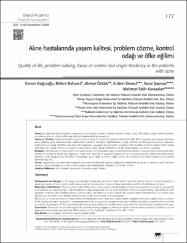Akne hastalarında yaşam kalitesi, problem çözme, kontrol odağı ve öfke eğilimi

View/
Access
info:eu-repo/semantics/openAccessDate
2014Author
Bağcıoğlu, ErmanBahçeci, Bülent
Öztürk, Ahmet
Deveci, Erdem
Şaşmaz, Sezai
Karaaslan, Mehmet Fatih
Metadata
Show full item recordCitation
Bagcioglu, E., Bahceci, B., Ozturk, A., Deveci, E., Sasmaz, S., Karaaslan, M.F., (2014).Quality of life, problem solving, focus of control and anger tendency in the patients with acne.Türkderm-Deri Hastalıkları ve Frengi Arşivi, 48(4), 177-181.Abstract
Amaç: Bu çalışmada akne hastalarının depresyon ve anksiyete düzeyleri, problem çözme, kontrol odağı, öfke eğilimi, yaşam kalitesi düzeyleri ve bunların aknenin klinik özellikleriyle ilişkisinin değerlendirilmesi amaçlandı. Gereç ve Yöntem: Çalışmamıza akne vulgaris tanısı konmuş 52 kişi ile 46 sağlıklı kontrol dahil edildi. Bütün hastalar, dermatolog tarafından akne şiddetine göre derecelendirildi. Katılımcılara Hamilton Anksiyete Değerlendirme Ölçeği (HAM-A) ve Montgomery-Asberg Depresyon Değerlendirme Ölçeği (MADRS) psikiyatrist (BE) tarafından uygulandı. Kısa Semptom Envanteri (KSE), Problem Çözme Envanteri (PÇE), Sürekli Öfke-Öfke Tarz Ölçeği (SOOTO) ve Rotter’in İç-Dış Kontrol Odağı Ölçeği (RİDKOÖ) ve SF-36 (Yaşam Kalitesi Kısa Form) uygulandı. Bulgular: Akne hastalarının depresyon ve anksiyete skorları kontrol grubuna göre anlamlı derecede yüksekti. Kısa semptom envanterinde akne hastalarının anksiyete bozukluğu, depresyon, kişiler arası duyarlılık ve paranoid düşünce skorları kontrol grubundan anlamlı derecede yüksek bulundu. SF-36 ölçeğine göre de fiziksel rol güçlüğü, genel sağlık ve mental sağlık skorları akne hastalarında kontrol grubuna göre anlamlı derecede düşüktü. Sonuç: Çalışmamızın sonuçları akne vulgarisin depresyon ve anksiyete gibi bazı psikiyatrik problemlere yol açtığı ve hastanın yaşam kalitesini olumsuz olarak etkilediği yönündeki önceki bulguları desteklemektedir. (Türkderm 2014; 48: 177-81) Background and Design: In this study, we evaluated anxiety and depression levels, levels of problem solving, focus of control, tendency to anger and quality of life in patients with acne as well as the association between those parameters and the clinical features of acne. Materials and Methods: Fifty-two patients with mild to severe acne vulgaris and 46 healthy controls were enrolled. Acne severity was graded in all patients by a dermatologist. The Montgomery-Asberg Depression Rating Scale (MADRS), Hamilton Anxiety Rating Scale (HAM-A), Brief Symptom Inventory (BSI), Problem Solving Inventory (PSI), The State-Trait Anger Scale (STAS), Rotter’s Internal-External Focus of Control Scale (RIELCS) and the Short Form 36-Item Health Survey (SF-36) were applied to all participants. Results: In our study, we found out that anxiety and depression scores were significantly higher in patients with acne vulgaris than in controls. In BSI, anxiety disorders, depression, interpersonal sensitivity, and paranoid thoughts scores were significantly higher in patients with acne than in controls. According to SF-36, physical role difficulty, general health and mental health scores were significantly lower in patients with acne. Conclusion: The results of our study support the previous findings suggesting that acne vulgaris leads to various psychiatric problems, such as depression and anxiety and, adversely affects quality of life of patients. (Turkderm 2014; 48: 177-81)

















